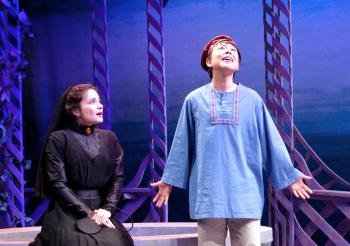NEW YORK—Twelfth Night is my very favorite of Shakespeare’s comedies, as it combines so many elements: sheer comedy (sometimes of a slapstick nature), tender love, mistaken identity, bittersweet sadness and a sense of loss, characters both delicate and rough, pomposity and lyricism, and some of the Bard’s loveliest poetry and song.
Bear in mind also that in Shakespeare’s day, all roles were played by men. So in those days there was Viola, a female played by a male, then “pretending” to be a male. In this production, as in almost all productions after Shakespeare’s time, Viola is played by a woman, in this case, Ali Ahn, who must pretend at times to be the male, Cesario.
Bear in mind also that Shakespeare has supplied a subtitle: “Or What You Will.” What you choose to make of it—perhaps whatever you wish. Interestingly, Twelfth Night is the only play that Shakespeare subtitled.
Theater Review: ‘Twelfth Night (Or What You Will)’
“Twelfth Night” is my very favorite of Shakespeare’s comedies, as it combines so many elements.

MISTAKEN IDENTITIES: (L-R) Olivia (Rachel Botchan) falls for Viola (Ali Ahn) whom she believe to be Cesario since Viola is disguised as a young man in Shakespeare’s “Twelfth Night.” Luke Redmond
|Updated:
Diana Barth writes for various theatrical publications and for New Millennium. She may be contacted at [email protected]
Author’s Selected Articles






